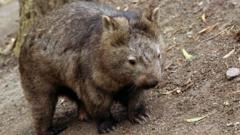A US influencer is under fire for a video that shows her grabbing a baby wombat from its mother, igniting fierce criticism from Australian officials and conservationists.
US Influencer Faces Outrage After Disturbing Baby Wombat Video

US Influencer Faces Outrage After Disturbing Baby Wombat Video
Australia's Foreign Minister speaks out against improper wildlife handling as an influencer's controversial video prompts calls for deportation.
Australia’s Foreign Minister Penny Wong has publicly condemned US influencer Sam Jones for her actions in a now-viral video where she takes a wild baby wombat from its distressed mother. The footage, filmed in Australia, shows Jones laughing while the mother wombat chases after them, concerned for her young. Conservationists are outraged, citing the potential harm caused to the wild animal and calling for repercussions.
Jones, who markets herself as an "outdoor enthusiast and hunter," has faced significant backlash from both the public and officials. Following the uproar, Australian Home Affairs Minister Tony Burke announced that immigration authorities are reviewing Jones's visa status, hinting at possible deportation. An online petition demanding her removal from the country has already garnered over 10,500 signatures.
The Wombat Protection Society has criticized the incident as exploitative, emphasizing that baby wombats share an essential bond with their mothers, making any forced separation highly distressing. Suzanne Milthorpe, Head of Campaigns at World Animal Protection Australia, stated, "Wombats are not a photo prop or plaything," and emphasized the laws in place protecting these native animals.
The video showed Jones capturing the joey and returning it to the road, raising concerns over its safety as it faced potential harm from traffic. Experts assert that Australia's wildlife protection laws are strict, permitting interaction with native animals only if they are in need of help.
Wildlife veterinarian Tania Bishop reaffirmed the legal implications of Jones's actions, stating that the law only allows for intervention when a joey's mother has perished. As Jones's online presence dwindles further with her account being made private, the incident has opened up broader discussions about wildlife conservation and the responsibilities of social media influencers.
Conservationists hope the backlash serves as a crucial call to action emphasizing wildlife protection and the impact of individual actions on vulnerable species.
Jones, who markets herself as an "outdoor enthusiast and hunter," has faced significant backlash from both the public and officials. Following the uproar, Australian Home Affairs Minister Tony Burke announced that immigration authorities are reviewing Jones's visa status, hinting at possible deportation. An online petition demanding her removal from the country has already garnered over 10,500 signatures.
The Wombat Protection Society has criticized the incident as exploitative, emphasizing that baby wombats share an essential bond with their mothers, making any forced separation highly distressing. Suzanne Milthorpe, Head of Campaigns at World Animal Protection Australia, stated, "Wombats are not a photo prop or plaything," and emphasized the laws in place protecting these native animals.
The video showed Jones capturing the joey and returning it to the road, raising concerns over its safety as it faced potential harm from traffic. Experts assert that Australia's wildlife protection laws are strict, permitting interaction with native animals only if they are in need of help.
Wildlife veterinarian Tania Bishop reaffirmed the legal implications of Jones's actions, stating that the law only allows for intervention when a joey's mother has perished. As Jones's online presence dwindles further with her account being made private, the incident has opened up broader discussions about wildlife conservation and the responsibilities of social media influencers.
Conservationists hope the backlash serves as a crucial call to action emphasizing wildlife protection and the impact of individual actions on vulnerable species.


















